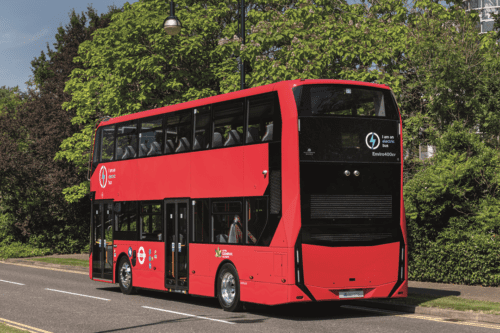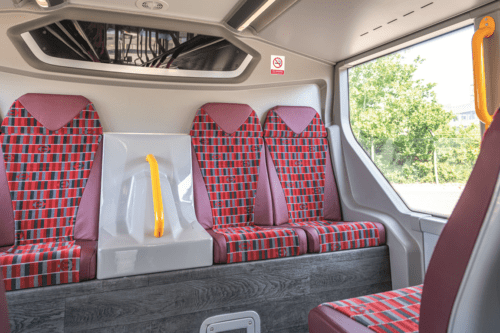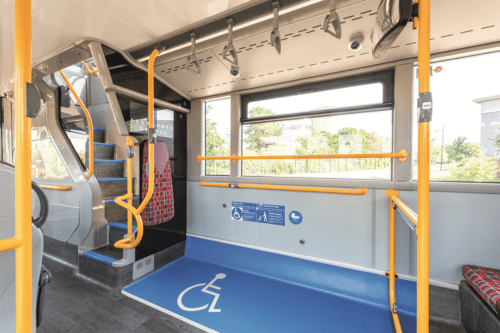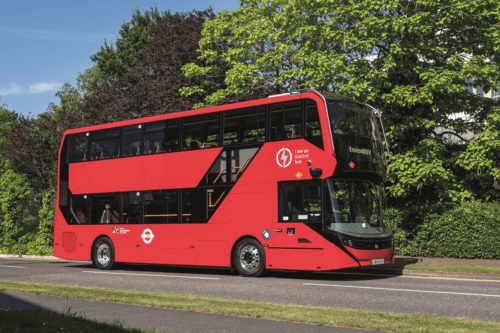
Alexander Dennis has unveiled the London-specification version of its new Enviro400EV double-decker
Alexander Dennis has unveiled its first next-generation Enviro400EV battery-electric double-decker built to Transport for London (TfL) specification. The London version of the manufacturer’s lattest double-deck vehicle is fitted with 472kWh batteries as standard, which the company says it is now able to warrant for 14 years or 1 million kilometres of service, whichever comes first, under normal operating conditions in the capital. This will allow the bus to cover two consecutive Transport for London (TfL) seven-year route contracts, says Alexander Dennis, without a need for battery replacement, contributing to low total cost of ownership.
According to the manufacturer, the batteries can be fully charged in as little as three hours through a DC plug connection, or faster still via the optional roof-mounted connector rails for overhead pantographs. Energy from the batteries powers the Enviro400EV through the heavy-duty version of the Voith Electrical Drive System, which has shown high efficiency ratings of 0.67kWh/km over the UK Bus Cycle in the Zemo Partnership’s zero-emission bus certification, increasing available range and contributing to the system’s longevity.
Group Sales & Business Development Director at Alexander Dennis Ben Werth explained: “For the TfL Enviro400EV, there is a design sweet spot that optimises available energy and therefore range, as well as vehicle efficiency, length, weight and passenger capacity. In addition to detailed route analysis, we have conducted extensive tests with our supply partners at the cell, module, pack and vehicle level, which have shown that 99% of London routes can be fully serviced with our 472kWh battery.
“This is backed by a fantastic 14-year battery warranty that gives TfL-contracted operators peace of mind by covering the full duration of two consecutive route contracts. This means our Enviro400EV for London meets range requirements whilst achieving highly attractive total cost of ownership and providing commonality and serviceability across the wider electric bus fleet.”
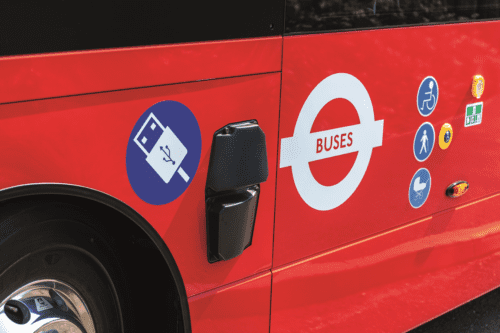
A 354kWh battery capacity version is also available, says the manufacturer, to maximise customer choice for routes where range is not as critical and increased passenger capacity or lower capital investment may be more important factors. Alexander Dennis offers to provide detailed computer simulation of any routes to be operated along with recommendations on the best-fit solution for specific routes.
The next-generation Enviro400EV for London measures 10.5m long, including a shorter wheelbase than the ‘provincial’ version aiding manoeuvrability in the capital’s dense traffic and busy streets, and giving it a 10.1m turning radius. The bus has been designed with TfL’s standard interior layout including a wheelchair bay accessed via an electric ramp at the centre doors. It seats 62 passengers on high-backed seats, with rear rows on both decks reduced to four seats to increase passenger comfort and safety. Total capacity is up to 87 passengers for the 472kWh version, or up to 96 passengers with 354kWh batteries.
Alexander Dennis says it has worked closely with TfL to ensure the Enviro400EV meets the latest iteration of the capital’s pioneering Bus Safety Standard; it was confirmed as the first vehicle to meet pedestrian head-impact requirements. The company has also engineered the bus to meet UN Regulation 155 on cybersecurity and cybersecurity management. Although not a legal requirement for the UK, this ensures that the vehicle is protected against malicious attack and that customers’ data is securely hosted within the country.
The first London-specification Enviro400EV is a demonstrator which will be made available to operators upon completion of its homologation and certification later this year.
Alexander Dennis says its next-generation Enviro400EV for London will soon be followed by the Enviro100EV, which it calls the ‘big small bus,’ designed to fit TfL’s smallest size category for single-deckers. Orders for both have been taken from London operators, the manufacturer reports, and the development of the new Enviro200EV single-decker is now under development; the latter will cover all other TfL vehicle size requirements.
Ben concluded: “This week’s launch is the first step in bringing the next generation of zero-emission buses to the capital. We’re not stopping here, with further models in preparation and our future battery roadmap showing growth in battery density, which points towards needing fewer batteries in future to deliver the same total energy at an even better total cost of ownership.”
